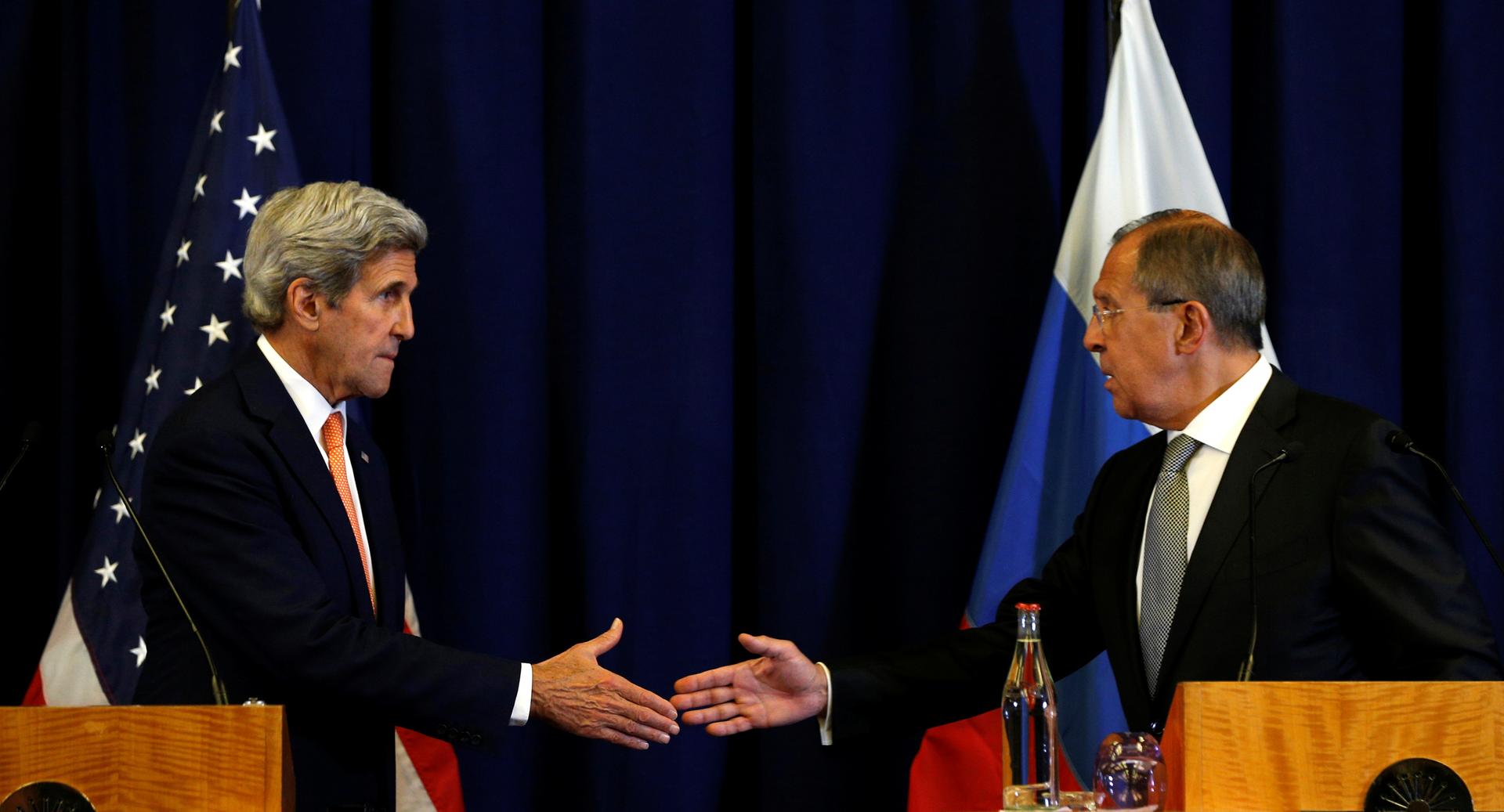Secretary of State, John Kerry, and Russian Foreign Minister, Sergei Lavrov (R), shake hands after a meeting in Geneva, Switzerland, where they formulated a new ceasefire plan for Syria
It seems everybody is on board for the latest ceasefire in Syria. Everyone, that is, except for those actually doing the fighting.
Neither the Syrian government, nor the Syrian opposition, have given a whole-hearted endorsement of the deal, which was agreed to on Saturday in Geneva by US Secretary of State John Kerry and his Russian counterpart, Sergei Lavrov.
And just hours before the ceasefire was to come into effect on Monday, Syrian President Bashar al-Assad said he intends to re-conquer all of Syria. Not "re-unite," but "re-conquer."
Amr al-Azm has no confidence that the ceasefire will actually hold. Azm is an associate professor at Shawnee State University in Ohio, teaching Middle East history and anthropology. He’s also a member of the Syrian opposition.
“The pattern of behavior of the regime and the Russians,” says Azm, “has demonstrated that these are temporary arrangements, but eventually they break down, and more often than not, they break down very very quickly.”
Azm says the deal is also weak in terms of verification, monitoring and enforcement.
The Assad regime has already signaled that it doesn’t like key parts of the deal, but will ignore them. Specifically, it has indicated it will maintain the siege of the rebel-held part of Aleppo.
The opposition was strong-armed into the deal by the United States, says Azm. “Remember, the opposition is essentially reliant on the United States and other western powers for support, supplies, weapons, etc., and if you read the letter that they received from the United States, it was very clear, and strongly worded, and it warned of dire consequences if they did not comply.”
The Kerry-Lavrov ceasefire deal excludes ISIS and another jihadi group, Jabhat Fateh al-Sham — formerly known as the Nusra Front. The deal points to possible joint US and Russian military operations against them.
However, Jabhat Fateh al-Sham has evolved as a necessary ally of the mainstream opposition, which needs its support on the battlefield. Most opposition supporters say their rebellion against Bashar al-Assad cannot survive without that military support from Jabhat Fateh al-Sham.
“This is very much a Putin deal,” says Azm. “I think most people looking at this see this as a victory for Putin and the Russians. Essentially the Russians get what they want.”
“All it’s doing is essentially strengthening the ability of the Assad regime to continue to strangle the opposition, and degrades the ability of the opposition to stand against Assad. So if the goal is to allow Assad to win outright, then that’s a good plan. But that’s not the stated position of the United States.”
That stated goal is for Assad to be removed from power.
“From Kerry’s perspective and the US perspective, I guess it’s the last chance they have — or at least Kerry’s last chance as secretary of state — to say ‘I did something.’ It’s a sign of desperation, you know, given the situation, anything is better than nothing, and if it comes at the expense of the Syrian people, if it comes at the expense of the position of the United States, and at the expense of US diplomacy, then so be it.”
“I think it’s a terrible deal,” concludes Azm, “and I think it’s a terrible shame that this has come to be.”
“Personally,” says Azm, “I think Secretary Kerry should just finish out his time and leave, and allow a new administration, whoever that may be, to come and take over. I think Secretary Kerry has used up everything he has and come out with nothing. The formula that Secretary Kerry has been using doesn’t work, and it’s not going to work, so it’s time to think outside the box and come up with something new.”
Kerry himself, speaking after the meeting in Geneva, told reporters that “if this arrangement holds, then we will see a significant reduction in violence across Syria. We’ll see humanitarian aid deliveries go forward in Aleppo and wherever the need is the greatest. And after a period of reduced violence, then we will see the United States and Russia taking coordinated steps to isolate and defeat the terrorist groups that have added immeasurably to Syria’s suffering and misery — and we will facilitate a political transition, which is the only way to bring about a durable end to this war.”
We want to hear your feedback so we can keep improving our website, theworld.org. Please fill out this quick survey and let us know your thoughts (your answers will be anonymous). Thanks for your time!
